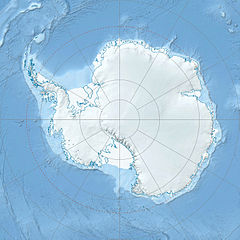- Trojan Range
-
The Trojan Range (64°32′S 63°23′W / 64.533°S 63.383°WCoordinates: 64°32′S 63°23′W / 64.533°S 63.383°W) is a mountain range rising to 2,760 metres (9,055 ft), extending northward from Mount Francais along the east side of Iliad Glacier, Anvers Island, in the Palmer Archipelago of the British Antarctic Territory. It was surveyed by the Falkland Islands Dependencies Survey (FIDS) in 1955 and named by the UK Antarctic Place-Names Committee (UK-APC) for the Trojans, one of the opposing sides in the Trojan War in Homer's Iliad.[1]
List of geographical features
- Mount Francais (64°38′S 63°27′W / 64.633°S 63.45°W) is a majestic, snow-covered mountain of 2,760 m, which forms the summit of Anvers Island, standing southeast of the center of the island and 6 miles north of Borgen Bay. It was first seen by the Belgian Antarctic Expedition, who explored the southeast coast of the island in 1898 and later sighted by the French Antarctic Expedition, 1903-05, under Jean-Baptiste Charcot, who named it for the expedition ship Francais.[2]
- Mount Hector (64°36′S 63°25′W / 64.6°S 63.417°W) is a snow-covered mountain, 2,225 metres, between Mount Francais and Mount Priam in the southern part of the Trojan Range. Surveyed by the FIDS in 1955. Named by the UK-APC for Hector, son of Priam and Commander in Chief of the Trojan and allied armies against the Achaeans in Homer's Iliad.[3]
- Mount Priam (64°34′S 63°24′W / 64.567°S 63.4°W) is the central mass of the Trojan Range, standing 4 miles north of Mount Francais. It is flat topped and snow covered and rises to 1,980 m. Surveyed in 1955 by the Falkland Islands Dependencies Survey (FIDS), it was named by the UK Antarctic Place-Names Committee (UK-APC) for Priam, King of Troy in Homer's Iliad.[4]
- Xanthus Spur (64°33′S 63°30′W / 64.55°S 63.5°W) is a mainly ice-covered spur extending northwestward from Mount Priam for three miles. It was surveyed by the Falkland Islands Dependencies Survey in 1955 and named for Xanthus, son of Zeus and the god of one of the two chief rivers of the Trojan plain.[5]
References
- ^ "Trojan Range". Geographic Names Information System, U.S. Geological Survey. http://geonames.usgs.gov/pls/gnispublic/f?p=gnispq:5:::NO::P5_ANTAR_ID:15568. Retrieved 2005-09-29.
- ^ "Mount Francais". Geographic Names Information System, U.S. Geological Survey. http://geonames.usgs.gov/pls/gnispublic/f?p=gnispq:5:::NO::P5_ANTAR_ID:5235. Retrieved 2005-09-29.
- ^ "Mount Hector". Geographic Names Information System, U.S. Geological Survey. http://geonames.usgs.gov/pls/gnispublic/f?p=gnispq:5:::NO::P5_ANTAR_ID:6553. Retrieved 2005-11-10.
- ^ "Mount Priam". Geographic Names Information System, U.S. Geological Survey. http://geonames.usgs.gov/pls/gnispublic/f?p=gnispq:5:::NO::P5_ANTAR_ID:12060. Retrieved 2005-09-29.
- ^ "Xanthus Spur". Geographic Names Information System, U.S. Geological Survey. http://geonames.usgs.gov/pls/gnispublic/f?p=gnispq:5:::NO::P5_ANTAR_ID:16846. Retrieved 2005-09-29.
 This article incorporates public domain material from websites or documents of the United States Geological Survey.
This article incorporates public domain material from websites or documents of the United States Geological Survey.
This Palmer Archipelago location article is a stub. You can help Wikipedia by expanding it.

